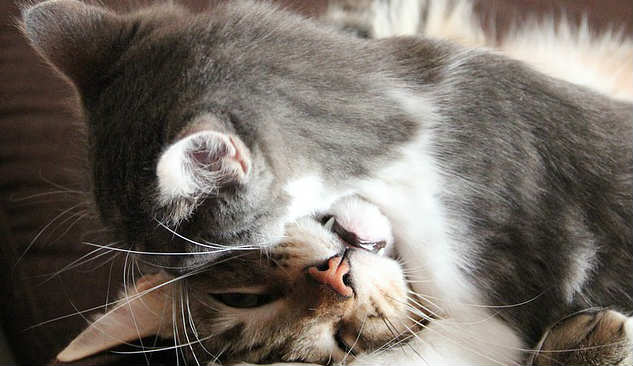What are some tips on how to calm an aggressive cat?
Original Question: JJ my cat went for neutering at 6 months at the same time as his brother Pepper. For JJ one testicle had not dropped so the vet said to wait to see if it would. At about 7-8 months, JJ started with sexual aggression towards his brother (littermate), smelling Pepper's anal area, harsh biting at the back of Pepper's neck, trying to mount him, and JJ exposing his penis. I immediately scheduled surgery as the physical assessment indicated the other testicle had not dropped. Abdominal surgery completed and the testicle was discovered to be deformed. Since that time he has continued to be sexually aggressive towards his brother; staking behaviour (some days worse than others), biting which causes Pepper to cry out. In addition to this, JJ’s other behaviour is loud meowing in the middle of the night, waking everyone up in the house. We are losing sleep over his behaviour. I have tried playing and then feeding him before I go to bed, installed a Feliway multi-cat diffuser in the living room and letting JJ sleep with me but it is not helping. He seems to be more Siamese then his brother - very vocal but at night it is a problem. My husband wants me to lock him in the basement at night or look for another home for the kitten (which I don't want to do as I love the little guy! he is very affectionate with me). - Lisa
 Jul 30, 2018
Jul 30, 2018
Hi Lisa,
Thanks for your question. Sorry to hear that you’re dealing with this.
Cryptorchidism in cats (a testicle that hasn’t descended) when we perform a neuter and will explore the abdomen or an area called the inguinal canal to find it. Your veterinarian didn’t recommend doing that at the time of surgery and probably had a good reason for it. Since then, that undescended testicle has been producing testosterone which contributes to the behaviors that you describe. Even though it was eventually removed, the behaviors had time to become ingrained and are now part of his personality. The testosterone caused them but even though it has been removed, the behavior is now ‘learned’ and will likely persist even without the testosterone being present.
You now have the difficult task of retraining your cat and trying to eliminate these behaviors. The first thing I recommend you do is to discuss behavior modifying supplements with your veterinarian. This may reduce the intensity of the behaviours and ‘take the edge off’. It sounds as though the Feliway has not been successful so you may need to progress to supplements or a medical prescription. You can further reduce the intensity of the behaviors by engaging him with play as much as possible. Here we have an article where we outline some strategies for entertaining a cat at home.
Try to buy toys that have ‘distance’ from you, such as a long feather or laser pointer. You don’t want to play with him with your hand or something you hold close to your hand or else he may start to think that you have become the plaything. Cats are territorial, especially ones that are or previously were under the effect of natural hormones. You could look at the option of separating the cats while you start these strategies and then reintroduce them very slowly by letting them smell each other’s space for a few days, then letting them see each other through a barrier and finally putting them in the same space together, all the while employing the treatments described already.
I would also make sure that there are no underlying medical conditions that have developed. Ask your veterinarian to perform routine blood work and a urinalysis to look for any abnormalities. Have them perform a physical exam to look for a source of pain such as joint issues or dental disease. Any source of pain can contribute to the intensity of the behaviors you are seeing.
Working with a professional would be ideal. You could ask your veterinarian to refer you to a behavior specialist. They will look at the environment that they live in and how they interact with each other and give you specific strategies to improve the behavior.
I hope this advice helps. I don’t think you need to give up yet. Using an anti-anxiety medication could have an immediate and successful effect. Also, you don’t have to use it indefinitely. If the behavior improves over a few months, he will learn to behave like that and much like the effect of the testosterone, it could be taken away and the improved behavior can become learned and will continue without the treatment.
Best of luck.
Dr. Clayton Greenway


Disclaimer: healthcareforpets.com and its team of veterinarians and clinicians do not endorse any products, services, or recommended advice. All advice presented by our veterinarians, clinicians, tools, resources, etc is not meant to replace a regular physical exam and consultation with your primary veterinarian or other clinicians. We always encourage you to seek medical advice from your regular veterinarian.

